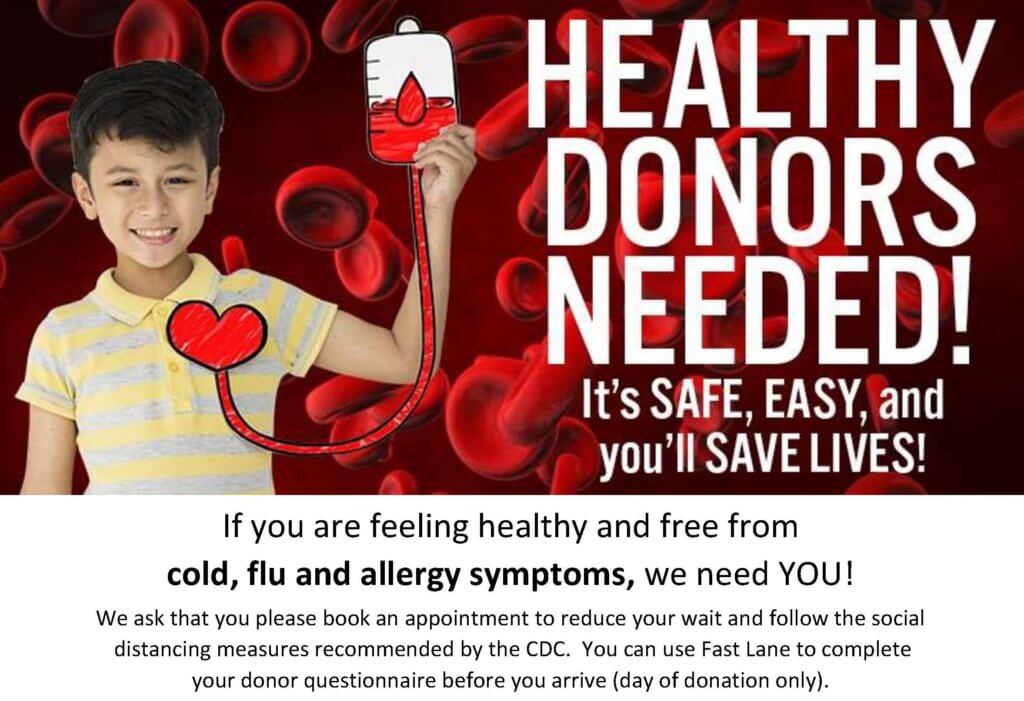Blood Donor Antibody Testing
The Blood Center Begins COVID-19 Antibody Testing on All Blood Donations
New Orleans, LA. – Effective Tuesday, June 2nd, The Blood Center (TBC) will begin testing all donors/donations for COVID-19 antibodies. This free service will inform the donor if they carry the COVID-19 antibody, which will indicate whether the individual has been exposed to the virus.
Antibody tests check your blood by looking for antibodies, which can show if you had a past infection with the virus that causes COVID-19. Antibodies are proteins that help fight off infections and usually provide protection against getting that disease again. Antibodies are disease-specific.
Those testing positive for the antibody should not assume they are immune from the virus. The antibody test is not for diagnostic use and will not indicate if currently have the COVID-19 virus and donors should never attempt to donate if they are experiencing any symptoms or are generally not feeling well. Depending on when someone was infected and the timing of the test, the test may not find antibodies in someone with a current COVID-19 infection.
To see if you are currently infected, you would require a viral test. Viral tests identify the virus in samples from your respiratory system, such as swabs from the inside of your nose.
Initially, the turnaround time to receive results will require a minimum of 48 hours after the donor completes their blood donation. The Blood Center is currently working to reduce that turnaround time to make results available no more than 24 hours post-donation. Donors need to visit TheBloodCenter.org and log in to My Account for their results.
Donors who test positive for COVID-19 antibodies may be eligible to donate COVID Convalescent Plasma (CCP).
We’ve seen promising results from patients who’ve received CCP, but there are only a few recovered patients who are eligible to give at this time. The scarcity of donors with the COVID antibody makes this test extremely beneficial to patient care.
Dr. Tim Peterson, Medical Director for The Blood Center
The performance of this testing will also provide surveillance to provide state officials, as TBC will be reporting this information to the Louisiana Department of Health regarding exactly what percentage of the population has been exposed to COVID-19.
TBC is using the Roche Elecsys® Anti-SARS-CoV-2 antibody test, which received the U.S. Food and Drug Administration Emergency Use Authorization in April. It’s designed to help determine if a donor has been exposed to the SARS-CoV-2 virus and have developed antibodies against SARS-CoV-2.
Thanks to the enormous efforts of our dedicated colleagues we are now able to deliver a high-quality antibody test in high quantities, so we can support healthcare systems around the world with an important tool to better manage the COVID-19 health crisis. I am in particular pleased about the high specificity and sensitivity of our test, which is crucial to support health care systems around the world with a reliable tool to better manage the COVID-19 health crisis.
Severin Schwan, CEO Roche Group
The serology test has a specificity greater than 99.8% and sensitivity of 100% (14 Days post-PCR confirmation). The high specificity of the test is crucial to determine reliably if a person was exposed to the virus and if they have developed antibodies.
For more information on blood donation, please call 1-(800) 86-BLOOD or visit TheBloodCenter.org. The Blood Center is active on social media at @TheBloodCenter.
The Blood Center, a nonprofit organization led by a volunteer Board of Directors, is the primary supplier of blood and blood components to more than 50 area hospitals and outpatient facilities throughout Southeast Louisiana and Southern Mississippi. The Blood Center operates 12 donor centers in the Gulf South.
About antibody testing
An antibody test, also called a serology test, is used to determine whether a person might have gained immunity against a pathogen or not. The human body makes antibodies in response to many illnesses. In the current situation of the COVID-19 pandemic, antibody tests need to be able to specifically detect antibodies against SARS-CoV-2 with no cross-reactivity to other similar coronaviruses, which could generate a false positive result and thus wrongly indicate potential immunity. A false positive result happens when a person receives a positive test result, when they should have received a negative result. False positives are particularly critical when we do not know how many people in a given population have had COVID-19. As of April 24, 2020, no study has evaluated whether the presence of antibodies to SARS-CoV-2 confers immunity to subsequent infection by this virus in humans.
About Elecsys Anti-SARS-CoV-2 serology test
Elecsys® Anti-SARS-CoV-2 is an immunoassay for the in-vitro qualitative detection of antibodies (including IgG) to Severe Acute Respiratory Syndrome Coronavirus 2 (SARS-CoV-2) in human serum and plasma. Through a blood sample, the test, which is based on an in-solution double-antigen sandwich format, can detect antibodies to the new coronavirus causing COVID-19, which could signal whether a person has already been infected and potentially developed immunity to the virus.
Based on the measurement of a total of 5272 samples, the Elecsys® Anti-SARS-CoV-2 assay has 99.81% specificity and shows no cross-reactivity to the four human coronaviruses causing the common cold. This means it can lower the chance of false positives due to the detection of similar antibodies that may be present in an individual but are specific for coronaviruses other than SARS-CoV-2. Elecsys® Anti-SARS-CoV-2 detected antibodies with 100% sensitivity in samples taken 14 days after a PCR-confirmed infection.
The importance of specificity and sensitivity of a particular test will be dependent on its purpose and disease prevalence within a given population.
